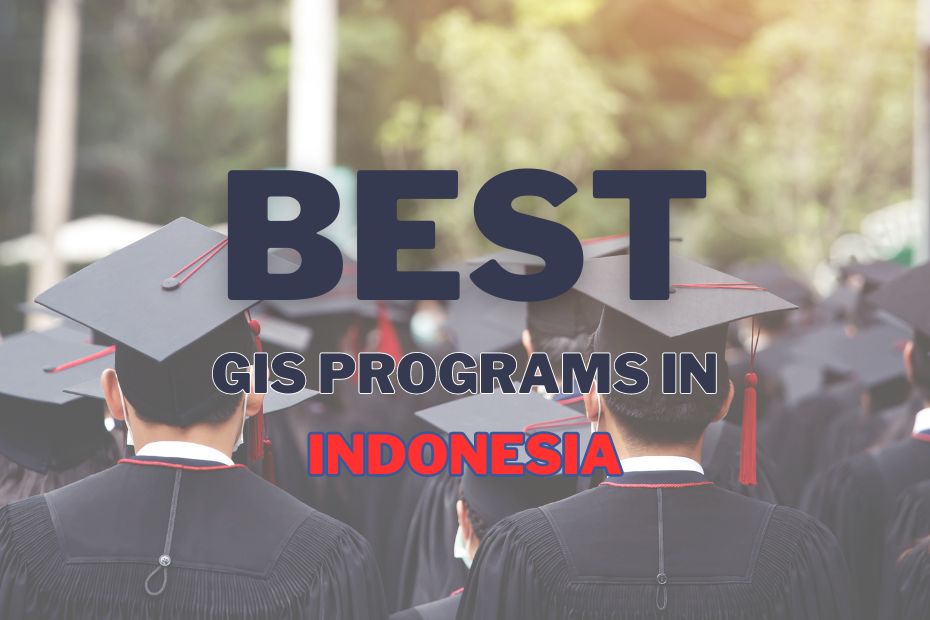Geographic Information Systems (GIS) have become pivotal in various sectors worldwide, and Indonesia is no exception. In this comprehensive guide, we’ll explore the Best GIS Programs in Indonesia, delving into the details of what makes them stand out.
The best GIS programs in Indonesia are offered by top universities like Universitas Gadjah Mada and Institut Teknologi Bandung, featuring comprehensive curriculums, state-of-the-art facilities, and strong industry connections. These programs are designed to equip students with advanced skills in GIS technology, preparing them for successful careers in various sectors such as urban planning, environmental management, and geographical research.
Why GIS in Indonesia Matters
Indonesia, with its vast archipelago, diverse terrains, and dynamic socioeconomic landscape, presents a compelling case for the application of Geographic Information Systems (GIS). Here are some key reasons why GIS matters in Indonesia:
- Environmental protection: Monitoring deforestation, managing disasters, and planning sustainable resource use.
- Smart city planning: Optimizing infrastructure, transportation, and service delivery based on spatial data.
- Precision agriculture: Boosting crop yields and minimizing environmental impact through soil analysis and market access insights.
- Citizen engagement: Empowering communities through interactive maps and transparent data access.
- Regional challenges: Addressing maritime security, climate change, and border management with spatial intelligence.
GIS is not just maps – it’s unlocking Indonesia’s potential for a sustainable and prosperous future.
Best GIS Programs In Indonesia
Here’s a look at some of the best GIS programs available in Indonesia.
1. Bandung Institute of Technology (ITB)
ITB’s renowned School of Geodesy offers a comprehensive MSc in Geoinformatics program, covering advanced topics like spatial databases, 3D modeling, and remote sensing.
MSc in Geoinformatics:
- Duration: 2 years (4 semesters)
- Fees:
- Indonesian citizens: IDR 18,000,000 per semester
- International students: USD 7,000 per semester
2. Gadjah Mada University (UGM)
UGM’s Faculty of Geography offers a well-established MSc in Geospatial Information Science, emphasizing applications in environmental management, disaster mitigation, and urban planning.
MSc in Geospatial Information Science:
- Duration: 2 years (4 semesters)
- Fees:
- Indonesian citizens: IDR 12,000,000 – IDR 15,000,000 per semester
- International students: USD 8,000 – USD 10,000 per semester
3. Sepuluh Nopember Institute of Technology (ITS)
ITS’s Department of Geomatics offers a practical MSc in Geoinformation Science, focusing on land use planning, resource management, and geospatial data analysis.
MSc in Geoinformation Science:
- Duration: 1.5 – 2 years (3 – 4 semesters)
- Fees:
- Indonesian citizens: IDR 10,000,000 – IDR 13,000,000 per semester
- International students: USD 6,000 – USD 8,000 per semester
4. Bogor Agricultural University (IPB)
IPB’s Faculty of Forestry offers a specialized MSc in Geographic Information Systems for Forestry, catering to professionals managing Indonesia’s vital forest resources.
MSc in Geographic Information Systems for Forestry:
- Duration: 2 years (4 semesters)
- Fees:
- Indonesian citizens: IDR 14,000,000 – IDR 18,000,000 per semester
- International students: USD 9,000 – USD 12,000 per semester
Here’s a table summarizing the course duration and fee structure for the four universities mentioned earlier:
| University | Program | Duration | Fees (Estimated) |
|---|---|---|---|
| Bandung Institute of Technology (ITB) | MSc in Geoinformatics | 2 years | IDR 18,000,000 |
| Gadjah Mada University (UGM) | MSc in Geospatial Information Science | 2 years | IDR 12,000,000 – IDR 15,000,000 |
| Sepuluh Nopember Institute of Technology (ITS) | MSc in Geoinformation Science | 2 years | IDR 10,000,000 – IDR 13,000,000 |
| Bogor Agricultural University (IPB) | MSc in Geographic Information Systems for Forestry | 2 years | IDR 14,000,000 – IDR 18,000,000 |
Please note that these are just estimates, and the actual fees may vary depending on the program, study track, and scholarship options available. It’s always recommended to contact the universities directly for the latest and most accurate fee information.
So, future GIS professionals of Indonesia, embark on your journey with confidence! Embrace the diverse academic landscape, explore your options, and choose the program that empowers you to map your own path to success in this dynamic field. Remember, the possibilities are endless in the fascinating world of Indonesian GIS!
Future of GIS in Indonesia
The future looks bright for GIS in Indonesia, with increasing adoption across various sectors.
Investing in a GIS education in Indonesia opens doors to exciting career prospects in various sectors, including:
- Environmental monitoring and conservation
- Urban planning and development
- Disaster management and preparedness
- Infrastructure development and management
- Precision agriculture and land management
- Location-based services and marketing
Additional Resources:
- Indonesian Institute of Surveyors (IIG): https://geodesi.itn.ac.id/
- Indonesian Society for Remote Sensing (ISRS): https://icoirsmapin2019.org/
- Indonesian Geospatial Information Agency (BIG): https://www.big.go.id/
Conclusion:
In conclusion, GIS programs in Indonesia offer a wealth of opportunities and are crucial for the country’s development. This article has provided a comprehensive guide to the best GIS programs, emphasizing their importance and impact.
FAQs: Best GIS Programs In Indonesia
What job opportunities are available after studying GIS in Indonesia?
Opportunities span across government, NGOs, and private sectors, in roles like GIS Analyst, Urban Planner, and Environmental Consultant.
Are there online GIS programs available in Indonesia?
Yes, several institutions offer online GIS courses, catering to the needs of remote learners.
What is the duration of most GIS programs in Indonesia?
It varies, but most full-time programs last 1-2 years.
How important is fieldwork in GIS education?
Fieldwork is crucial as it provides practical experience in data collection and analysis.
